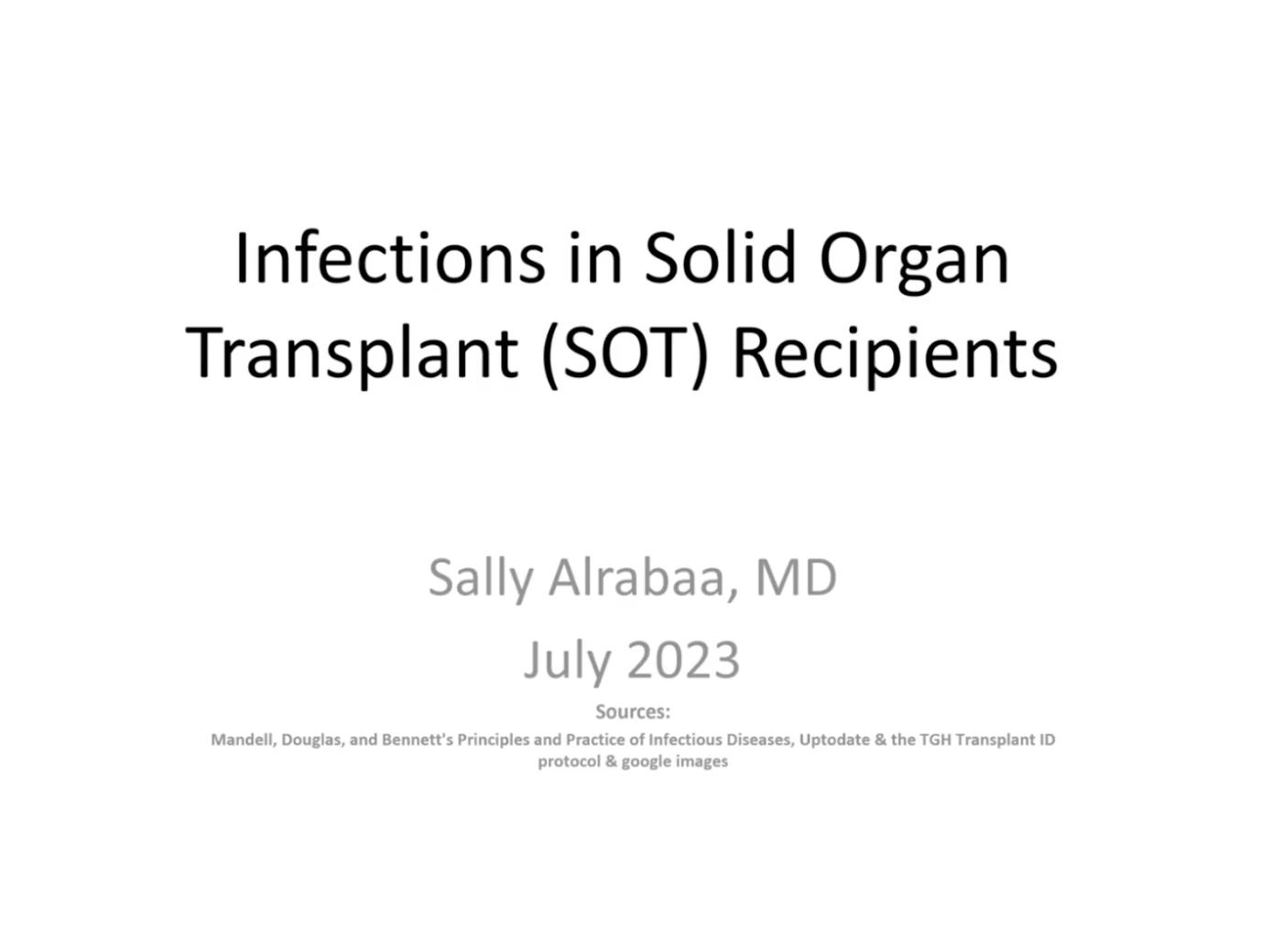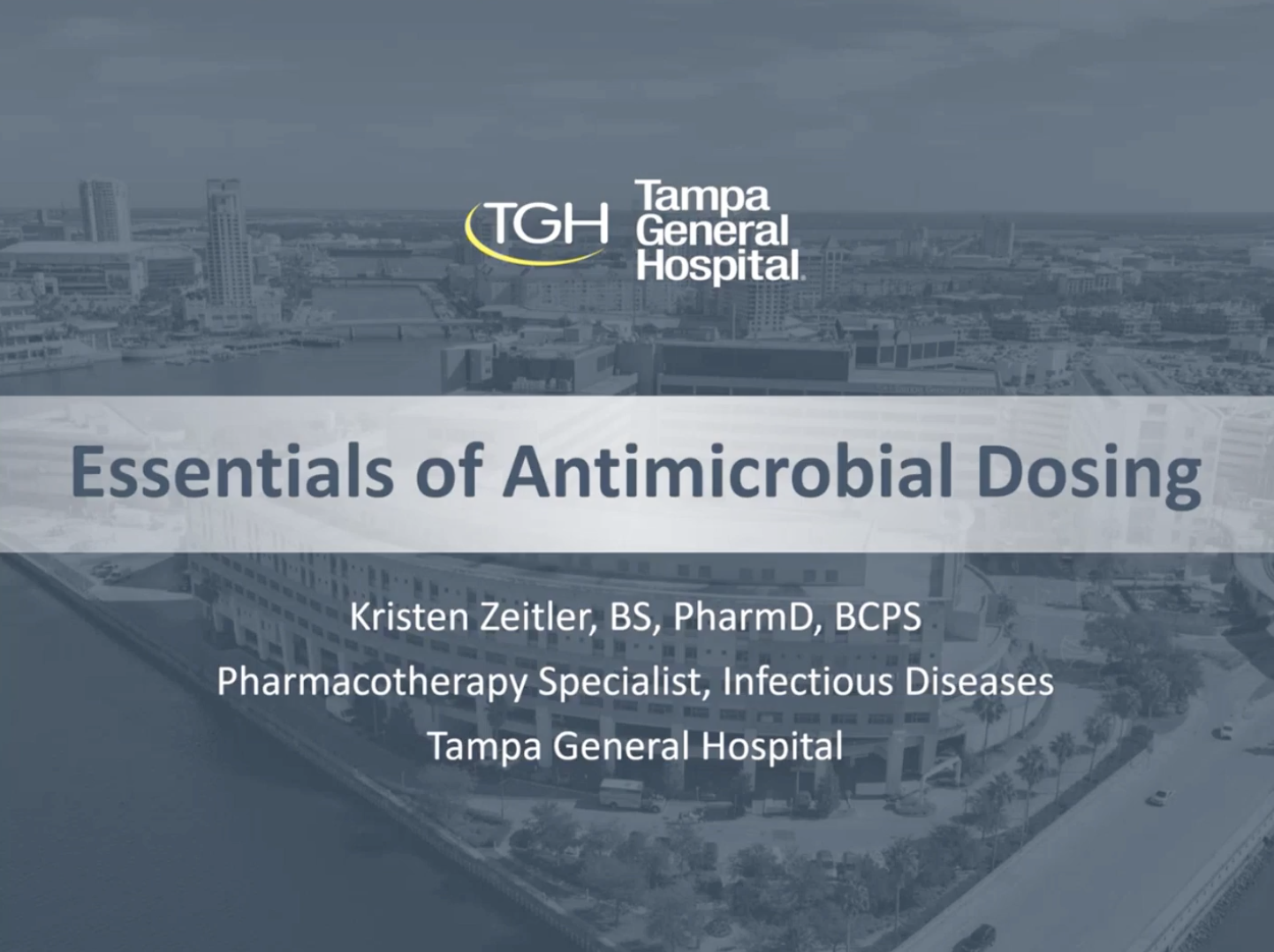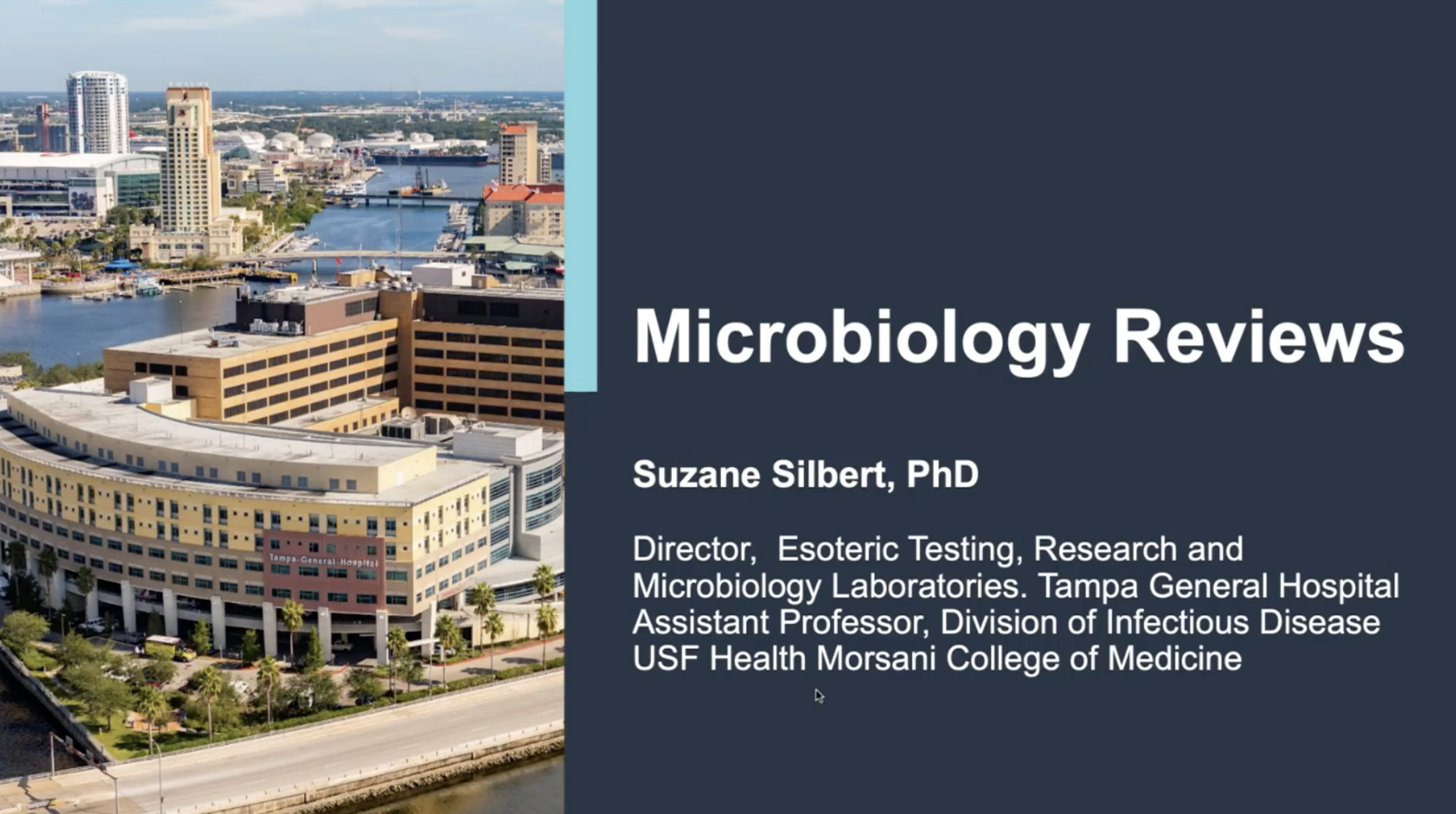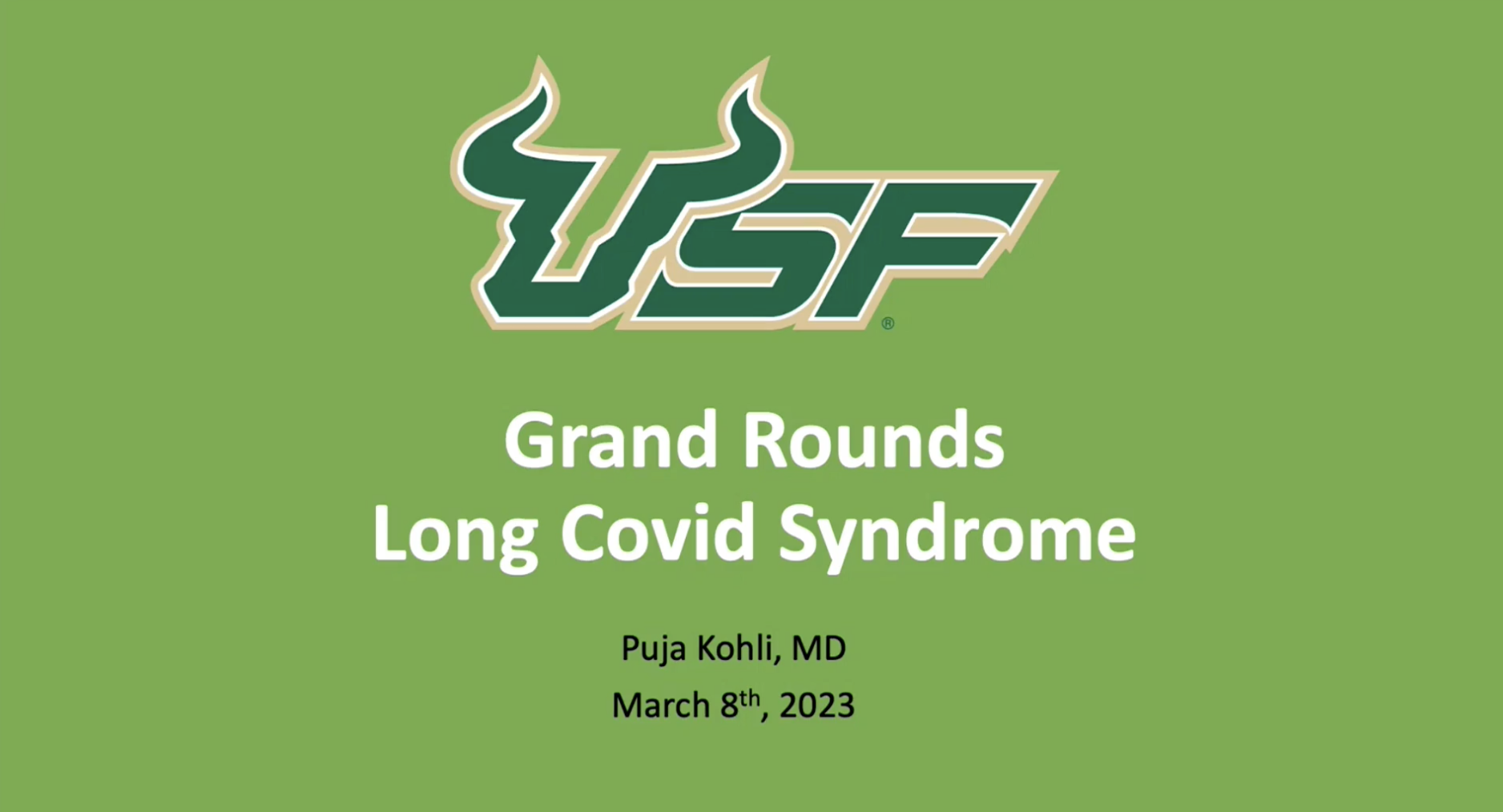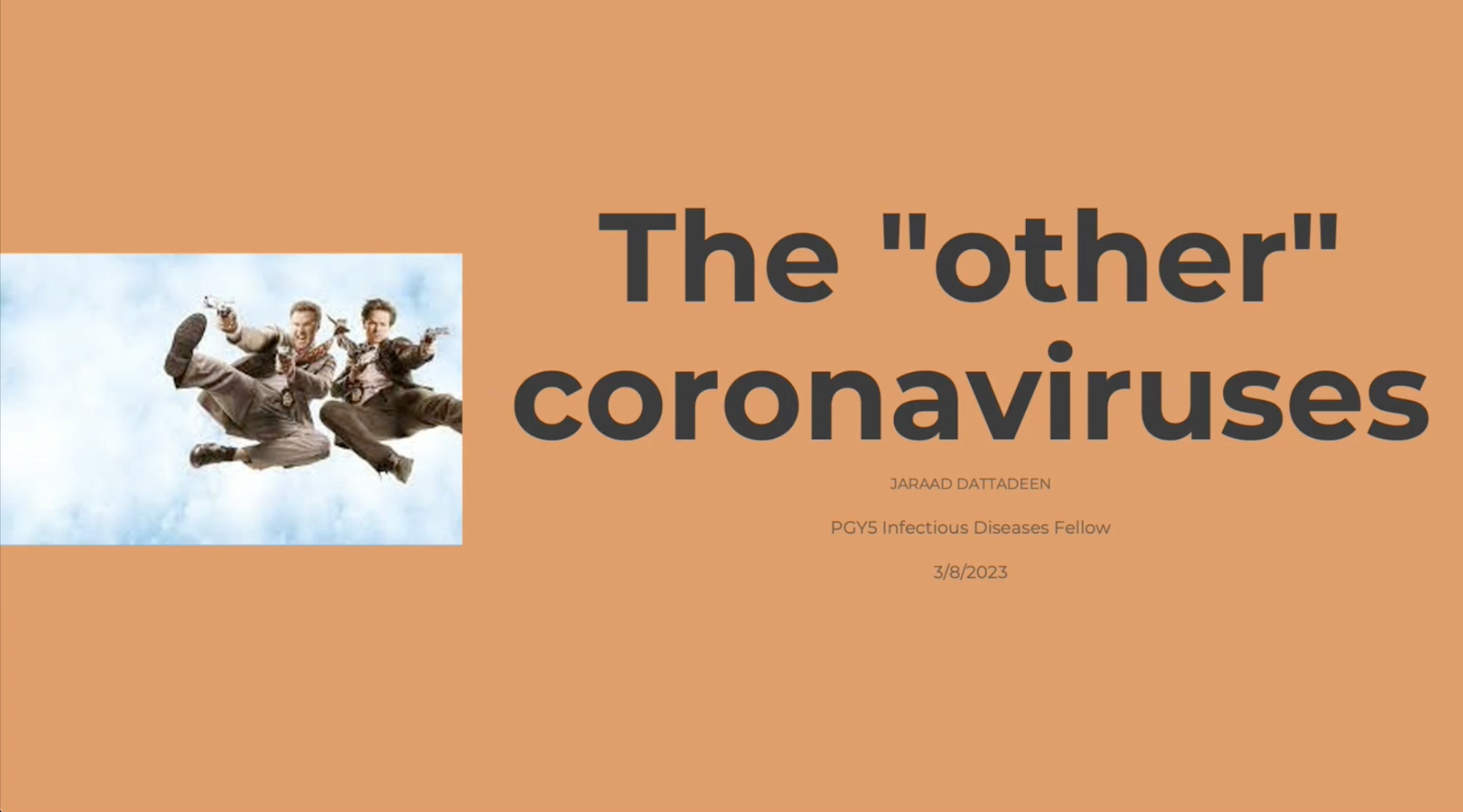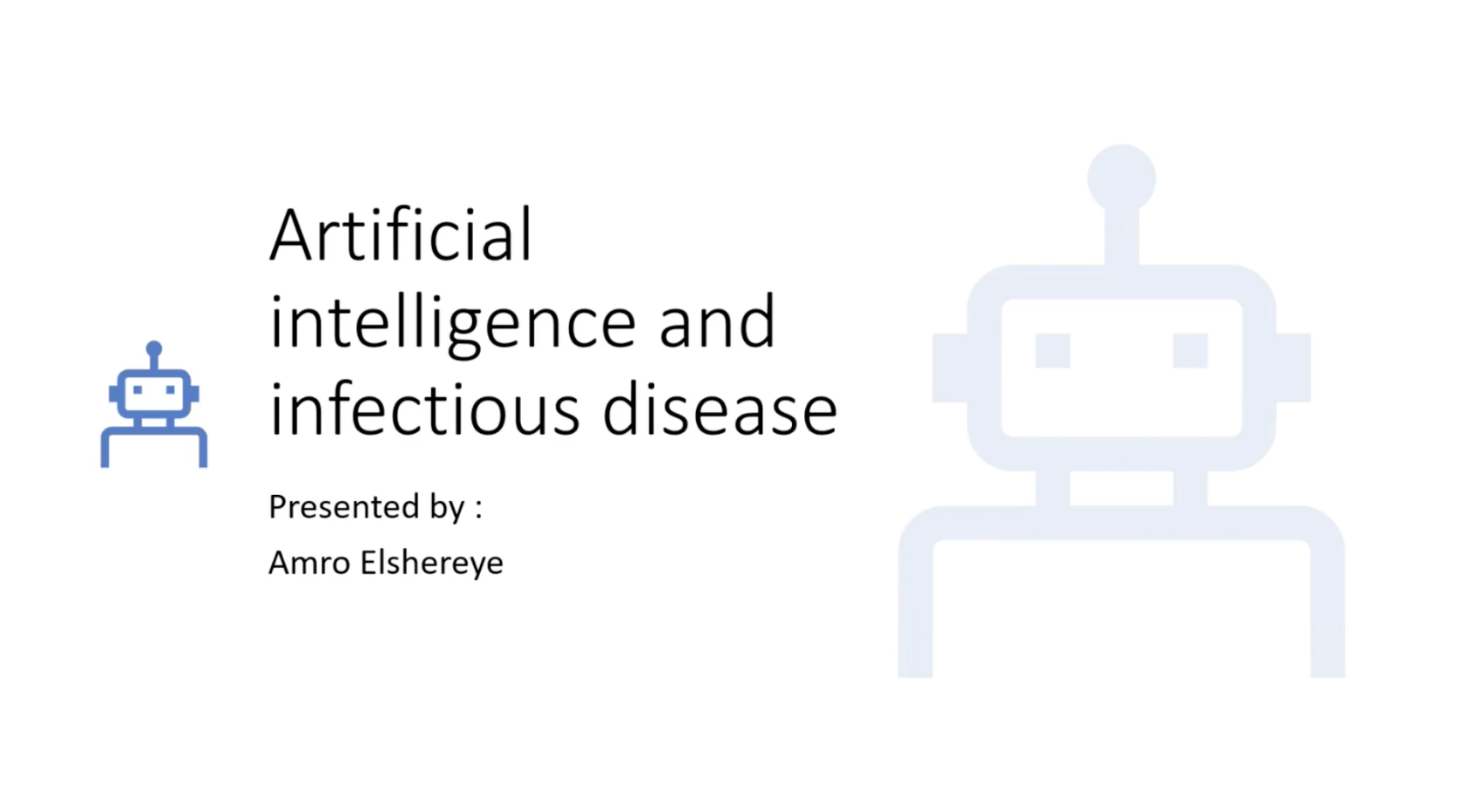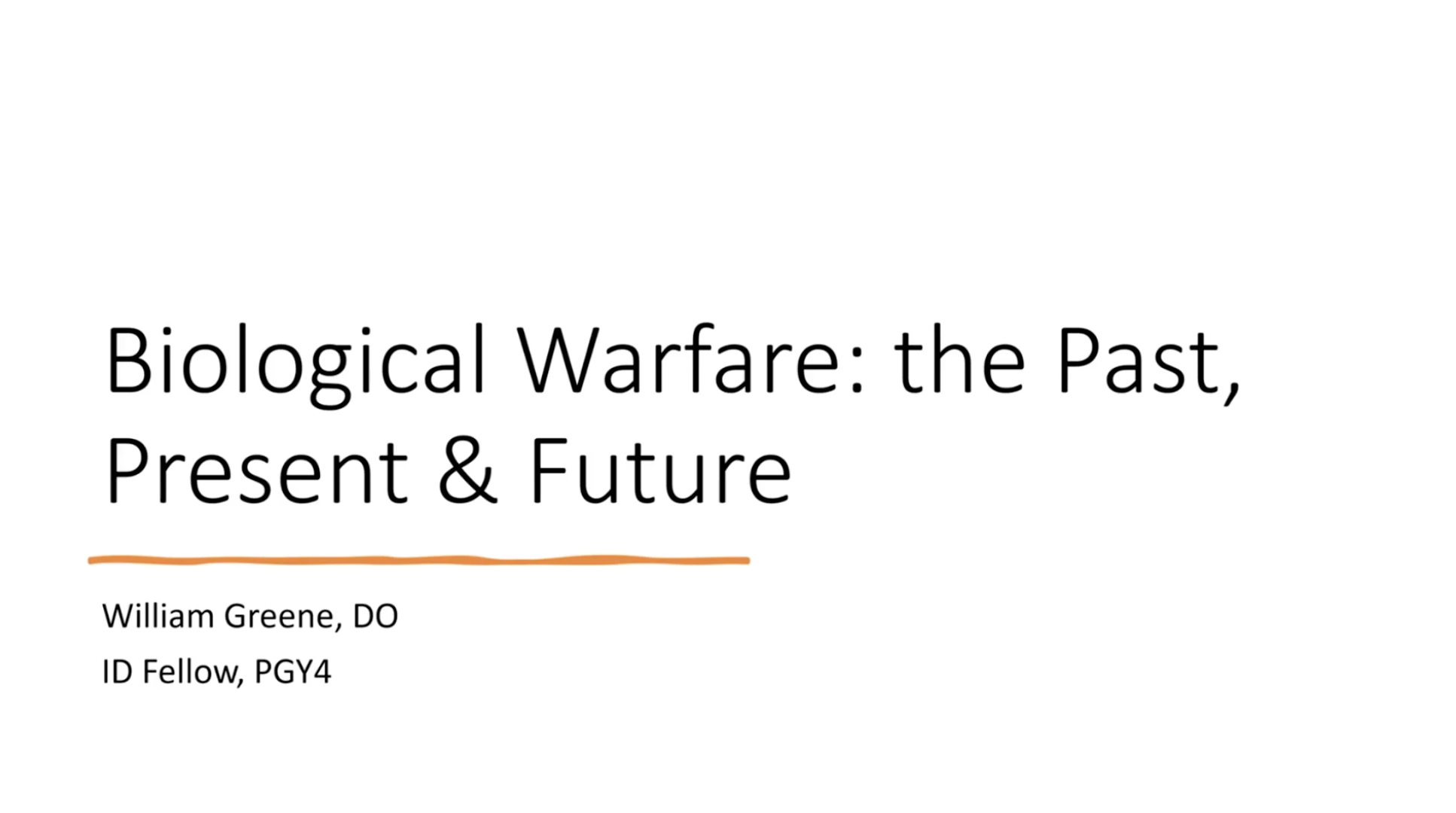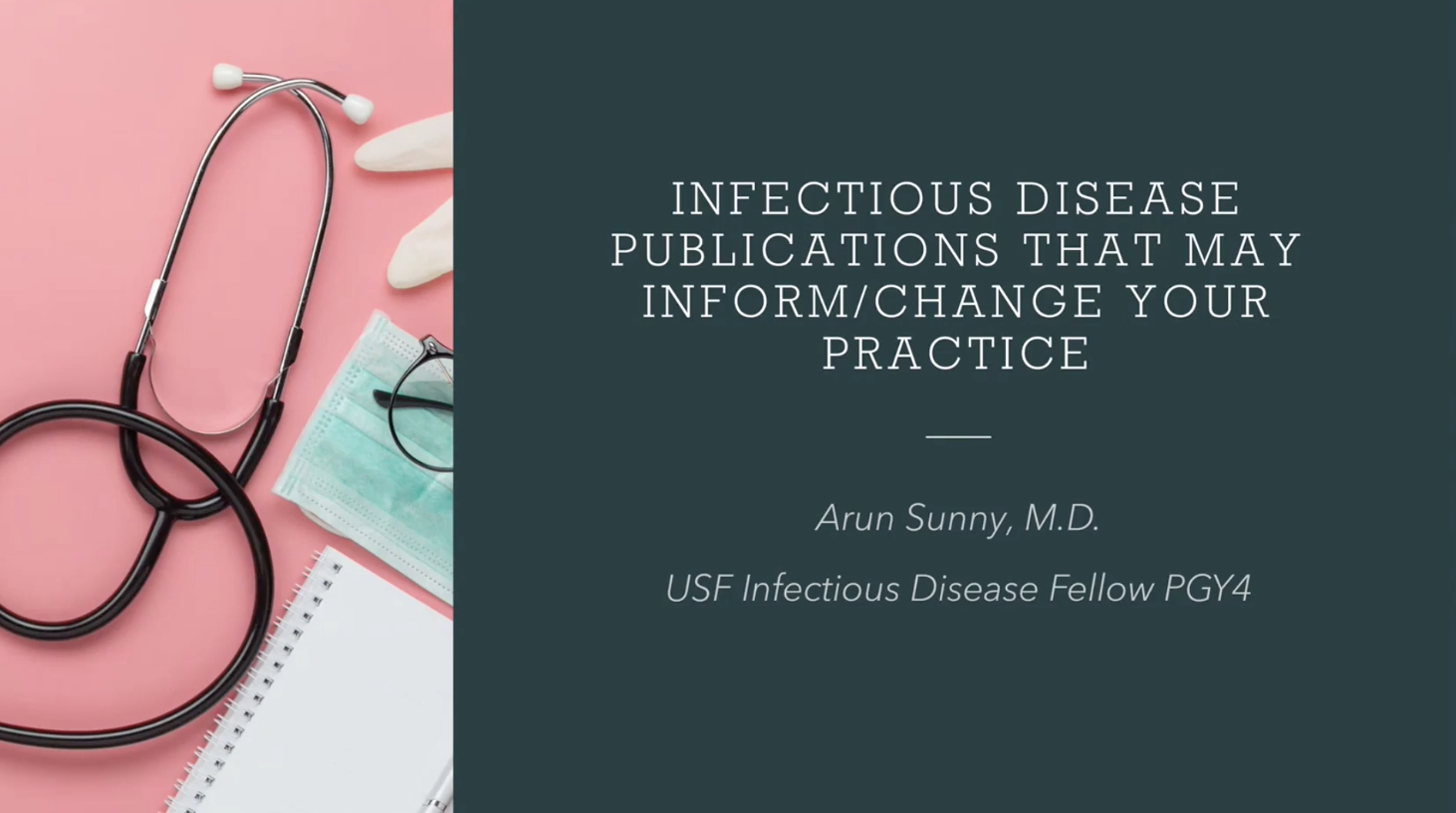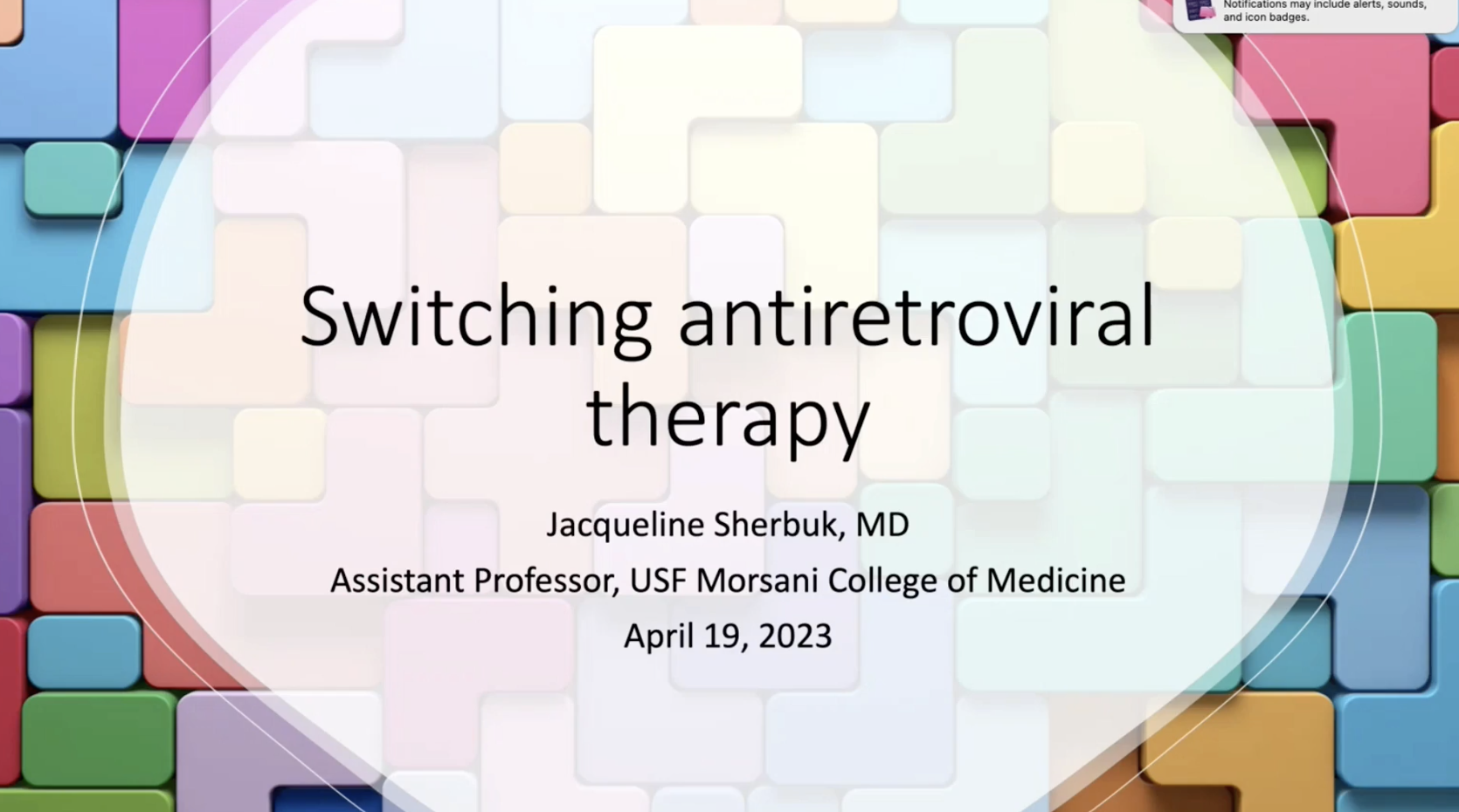Dr. Sally Alrabaa, Co-Director of Transplant Infectious Diseases at the Morsani College of Medicine, presents an overview of infection issues surrounding the solid organ transplant patient. Dr. Alrabaa differentiates specific infections based upon the early, medium, and late transplant periods. She then covers infections associated with certain specific immunosuppressive regimens. Next, the speaker discusses infections characteristic of different transplant types, including kidney, heart, liver, and lung transplants. Lastly, Dr. Alrabaa briefly touches upon Covid-19 and transplantation.
Archives
Essentials of Antibiotic Dosing
Dr. Kristen Zeitler, a pharmacist and pharmacotherapy specialist at Tampa General Hospital, discusses basic information about how to properly dose antimicrobial agents in hospital patients. Dr. Zietler begins by discussing the role that ID clinical pharmacist play in hospitals. She then compares and contrasts the differences between pharmacokinetics (PK) and pharmacodynamics (PD). The principles of pharmacokinetics are then covered, with regard to absorption, distribution, metabolism, and elimination. Next, PK/PD concepts are explored, especially as it relates to Vancomycin. Lastly, adjustment of dosing in renal insufficiency or dialysis is explored.
Basic Principles of Microbiology
Dr. Suzanne Silbert, Microbiology Director for Tampa General Hospital, presents this introductory talk on the basics of the microbiology lab. Dr. Silbert begins with an overview of clinical microbiology, and then reviews the basic classification standards for bacterial organisms, viruses and fungi. She then goes on to discuss culture cultivation techniques, including the use of liquid, solid, or semi-solid media. The speaker then covers identification systems for bacterial organisms, including MALDI-TOF, Disk-Diffusion, and molecular diagnostic techniques. A robust question and answer session concludes the session
Long Covid Syndrome
Dr. Puja Kohli, Infectious Diseases Fellow at the University of South Florida Division of Infectious Diseases, provides an update on Long Covid Syndrome. Dr. Kohli begins by discussing what is believed to be the pathophysiology of long Covid, including the immunology behind the long manifestations of the disorder. She then breaks down the specific features of long Covid syndrome by organ system, including respiratory, cardiovascular, hematologic, CNS, renal, and GI manifestations. She then discusses specific treatments for long Covid, including proactive strategies as well as some of the debunked treatments that continue to be used by some communities outside of mainstream medicine. Other treatments are also discussed, including antibiotics, monoclonal antibodies, and SSRIs.
The “Other” Coronaviruses
Dr. Jaraad Dattadeen, Infectious Diseases Senior Fellow at the Division of Infectious Diseases at the USF College of Medicine, discusses coronaviruses other than SARS-CoV2. Dr. Dattadeen begins by discussing the general classification of Coronaviruses as well as their microbiology. The speaker covers SARS CoV-1, MERS, as well as HCoV-OC43, HCoV-229, HCoV-NL63, and HCoV-HKU1. Each virus subtype is compared with SARS-CoV2. The intermediate hosts and reservoirs of select coronaviruses are also discussed.
Artificial Intelligence and Infectious Disease
Dr. Amro Elshereye, Infectious Diseases Fellow at the Morsani USF College of Medicine, explores the burgeoning field of artificial intelligence (AI) in medicine in this interactive presentation and faculty discussion. The speaker begins by discussing early warning systems such as Healthmap which utilize AI to predict developing outbreaks. Next, Dr Elshereye explains voice recognition technology in medicine, including AI-powered transcription systems such as Dragon Medical One. The discussion then moves on to generative transformer technology including ChatGPT, which could revolutionize many fields of health practice, including consultation, doctor-patient communication, and diagnostic interpretation. Lastly, Dr. Elshereye also explores the drawbacks of artificial intelligence and some of the grave predictions many technology thought leaders have made if guardrails are not put in place soon enough for AI.
Biological Warfare: Past, Present and Future
Dr. William Greene, Infectious Diseases Fellow at the USF Morsani College Medicine, discusses biological weapons in this new podcast. After defining the concept of a bioweapon, Dr. Greene first discusses the extensive history of bioweapons, starting in ancient times, extending through the middle ages, through the world wars, and beyond the cold war to the present day. Next, Dr. Greene categorizes biologic terrorism agents by their CDC category, and discusses current bioterrorism threats. These include Anthrax, Plague, and Smallpox. Specific treatments to these infections are also discussed.
Notable Recent Studies that Could Affect Your Practice
Dr Arun Sunny, infectious diseases fellow at the USF Morsani Division of Infectious Diseases, discusses three main publications that could change the practice habits of an Infectious Diseases specialist. The three publications involve: (1) The use of post-exposure doxycycline to prevent sexually transmitted infections; (2) The use of hydrocortisone for severe community acquired pneumonia; (3) Early lead extraction for infected implanted electronic devices; and (4) The effects of early sign-offs (discontinuation of care) of infectious diseases consultants. The presentation includes a lively discussion from participants on the merits and pitfalls of each of the presented studies.
Switching Antiretroviral Therapy
Dr. Jacqueline Sherbuk, Assistant Professor of Medicine at the University of South Florida Morsani Division of Infectious Diseases, presents information on considerations for switching antiretroviral therapy in the HIV positive patient. Dr. Sherbuk begins by presenting the indications for switching therapy (pill burden, adverse effects, etc). Next, she explains various factors to consider when switching regimens, including prior ARV (antiretroviral) history, comorbidities, and so on. Next she covers the reasons for virologic failure, and how resistance assays are crucial to determining the best path forward if ARV agents need to be modified. Dr. Sherbuk then relates the basic principles of choosing a new ARV regimen. Lastly, the speaker discusses several case based examples of switching therapy with explanation of the rationale and best practice approaches in doing so.
HIV in the Elderly
Dr. Todd Wills, Professor of Medicine with the Morsani College of Medicine at the University of South Florida, reviews the unique complications and issues that can occur in the elderly HIV patient. Dr. Wills begins by reviewing the epidemiology of HIV by age group, including the fact that the HIV positive population is growing older with time. Dr. Wills also discusses issues regarding polypharmacy and medication tolerability in the older patient. Next, the speaker relates how the high prevalence of chronic diseases affect the HIV positive patient’s prognosis. HIV positive elderly patients can suffer not just from frailty, but from cardiovascular disease, diabetes, osteoporosis, and cancer. Dementia can also affect an elderly HIV paitent’s overall wellness and compliance with antiviral therapy. Dr. Wills also covers the assessment of bone density in elderly HIV positive patients. Lastly, Dr. Wills discusses HIV positive patient life expectancy in the modern age of antiretroviral therapy.
